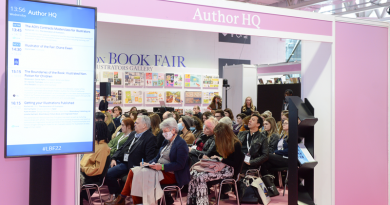Free or Fee? Valuing Content in the Digital Era – Part 1
Suzanne Kavanagh is Publishing Sector Manager for Skillset, the Sector Skills Council for Creative Media in the UK. Follow her on Twitter at @sashers.
 Those who know me well have seen me out and about at various events to network and discover the latest thinking around key issues for publishing.
Those who know me well have seen me out and about at various events to network and discover the latest thinking around key issues for publishing.
There’s nothing like a few conferences to broaden your mind and get you thinking about the future. Last week was no exception with three events.
And so my conference roadshow rumbled on to LCC’s annual student-organised offering: two afternoon panel discussions on the value of digital content.
This was a short event, but I found myself writing copious notes. So I’m providing a couple of updates, to give you a flavour of what was said at each session.
Books are dead! Mobile is king! Long live books!
The opening speaker was Ben Hammersley, Editor-at-Large of Wired UK (indeed he was at large and spotted 20 minutes after he’d finished at another event at the LSE).
He is an engaging speaker, not afraid to tell the audience: “if you’re not producing content for all platforms – especially mobile – your business will die.” Straight to the point, then.
He also made a pertinent point (much to the relief of many in the room) that the old formats won’t die. Cinema didn’t kill theatre, the iPad won’t kill print. Each format is usually better in one way than the other.
What it means for digital writing skills is that you have to use words to maximise each of the different platforms. He also stressed the importance of metadata: you HAVE to get it in at point of source (and here comes the sell) his new company Dangerous Precedent is a way of working with authors to do just that.
Getting the right metadata for enhanced discovery online is critical. No one else knows the places, companies, names, subjects, brands or key words like the author.
He raised a chuckle in the audience with his candid views on magazines “most magazine websites and apps are rubbish”. His closing remark was that Steve Jobs has broken the industry, but there you have it. For Hammersley, it’s simple. We’re in a totally digital world. Deal with it.
Free or Fee?
The first industry panel had a focus on the magazine and business media industry.
 Each panelist was (strictly) limited to five minutes on the “Free or Fee?” question. Mark Beilby, Chairman of Apollo Media, technology and app developer, kicked off.
Each panelist was (strictly) limited to five minutes on the “Free or Fee?” question. Mark Beilby, Chairman of Apollo Media, technology and app developer, kicked off.
With a technologists take on the changes impacting publishing he claimed “the world has changed irrevocably” (world = business model). It’s not all bad as other revenue models will open up, but bear in mind that people won’t pay for what they can get free. Communities are particularly suited to digital. The key to being successful is about being timely and adding value, wrapped around good content.
Fiona Dent from IPC Media, reeled off some impressive stats on consumer women’s market that blow assumptions about women’s digital appetite out of the water. With 10 million women on Facebook (2nd only to Google) and 70% of mass market consumer purchase decisions made by women, this is a market you cannot ignore. At the heart of her argument is that you have to know your market – inside and out – and it is clear that IPC do. This is key to knowing where, when and what you can charge for with digital content (or any other format for that matter).
An interesting example of how digital has subverted the usual business model is their web-first product – www.goodtoknow.co.uk – which now has a spin-off print product called Good to Know Recipes. It launched in May and is 30% ahead of target. Traffic to the website and searches in Google have increased. The website makes money. They are obviously chuffed about this.
Nick Brett from BBC Worldwide was next up. As a former anarchist, he welcomes the challenges that multi-platform content presents to editorial teams. This is an unbridled time of creativity. His top tip? Be aware of the consumer and only then decide what the appropriate medium is.
Kurt Edwards from Future Publishing closed the presentations. His was a plea to ensure that the number of subscriptions you gain from new digital content, minus the number of print subscriptions lost, must equal more money. Otherwise there’s no point doing it. The major challenge for publishers is to understand why people will pay for digital content. It’s about convenience. It’s about a great experience. It’s about ease of purchase, value and timeliness.
The questions session was quite lively and raised a number of thorny issues. The panel felt that the industry needs to take the self-indulgence out of writing, there’s just no room for it anymore. We shouldn’t focus on the iPad too much – despite the rumoured 25,000 iPad orders per minute – with technology companies such as Samsung and LG sinking huge amounts of money into lightweight mobile devices and operating systems. And remember, the market is clearly opening up for handheld reading devices: Princeton having recently announced that they are loading the whole reading list on to a Kindle (cue groans from the audience).
In Part 2: Who Pays for “Free”?

![Reblog this post [with Zemanta]](http://img.zemanta.com/reblog_e.png?x-id=491dcd8a-6c61-4856-9fd4-96a12cf7e5ca)
